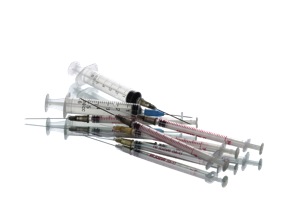
“Can you imagine what a pile of 1.8 million dirty syringes would look like?”
That was the question posed by the City’s emergency medical director, James Dunford, regarding the City’s Clean Syringe Exchange Program that he chairs, and he told the recent Public Safety and Neighborhood Services Committee his own answer.
“That’s what we have been able to keep off the streets in San Diego,” said Dunford, referring to the total number of dirty needles the program has received since its start in 2001.
A non-descript mobile van accepts dirty syringes from drug addicts in downtown and North Park once a week and also gives out clean needles in exchange. Addicts are given referrals for drug treatment, detoxification services, mental health and other medical problems.
“Our conclusion is this is successful as a public health and safety strategy that has been shown to be helpful,” said Dunford.
“Even if you don’t like the part of trading needles, you have to realize what we’re really doing is a come on,” said Dunford. “It’s a come on, a gateway to refer people to drug treatment, HIV counseling, referring people to health care and other services.”
Dunford and other officials from the Family Health Centers, which administers the program, presented their findings to the committee as part of its annual report.
The report says nine out of every 10 clients are given referrals to drug treatment or other types of programs which also include referrals for shelter, food, clothing, Medi-Cal, HIV, hepatitis and STD screening.
San Diego has the third highest rate of HIV infection in the state, and last year more than 2,000 people were diagnosed with Hepatitis C, which is mostly contracted from using dirty needles.
Hepatitis C is the number one cause of liver cancer and the leading condition requiring a liver transplant.
The report says 7,222 have died of AIDS in San Diego since 1981. Approximately 23 percent of women with AIDS and 11-18 percent of men with AIDS were infected through dirty needles, the report says.
One goal is to prevent accidental needle sticks by police and fire-rescue personnel who interact with addicts who may have dirty syringes in their pockets. Dirty needles have been found in sandboxes, trash bins, beaches and off freeways.
The Clean Syringe Exchange Program is operated by the Family Health Centers of San Diego, which is a non-profit community clinic organization.
Current funding comes from community development block grants, which are approved by the City Council and private donors, such as the Human Dignity Foundation and AIDS United.
Alliance Healthcare Foundation provided most of the funding in the first decade of the program’s operations. The report says without their support, the City “would likely not have” the program.
In the past, the City Council had to vote for a state of health emergency due to the infections of HIV/AIDS and Hepatitis C in order to legally give out clean needles in exchange for dirty ones. State legislation changed in 2006 allowing cities to operate such programs with only an initial resolution.
No one spoke in opposition to the program and many praised it, such as Third District Councilmember Todd Gloria who said he had visited the sites where the needles were exchanged and clean ones given out.
“It’s very professionally run. It’s extremely discreet,” said Gloria. “People are there, they get the (drug) referrals. You see people getting referrals to hopefully break the cycle.”
“Since 2002, this program has accepted 180,000 more syringes than it disbursed and has prevented more than 1.8 million syringes from improper disposal,” said Gloria. “That’s public safety, ladies and gentlemen.”
“If we could just add the County to this growing list of supporters, it would be even better,” said committee chairperson Marti Emerald. “That’s my soap box comment for today.”
“The County remains opposed to this program, so we won’t see any funding there,” said Ben Avey, the media relations manager for Family Health Centers.
Councilmember Lorie Zapf asked why the County was opposed, and several people said it was philosophical, but no one said the word political.
All five County supervisors are Republican since 1995, but Dave Roberts, a Democrat, won the seat of retiring supervisor Pam Slater-Price Nov. 6.
“I understand the benefit of taking all these syringes out, especially when so many are found, for example along the river … we don’t want these to make their way down to the beaches and bays,” said Zapf, a Republican.
Though no one at the meeting expressed opposition, former Mayor Dick Murphy was opposed to it because he said it encouraged illegal drug use. He remained opposed to the program during his tenure from 2000 until he resigned in 2005.
During the meeting, Gloria said other branches of government which oppose the program are “ignoring science.”
“I know few things that save more money than keeping someone from infectious disease. This is one way of doing that,” said Gloria.
The program operates with a facilitation committee whose members include two public health experts, San Diego Association of Governments program operator, people from the community and a San Diego Police officer in the narcotic division.
The mayor appoints people to sit on the facilitation committee.
The needle exchanges take place in vans that meet downtown Thursday evenings and in North Park Friday mornings. Some diabetics also dispose of their insulin needles in the program.











